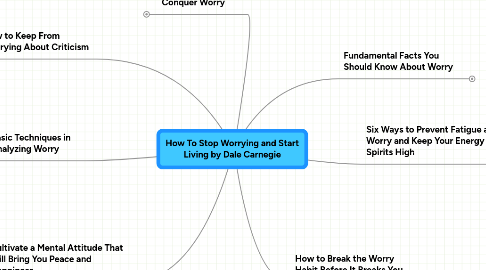How To Stop Worrying and Start Living by Dale Carnegie
by Jeff Cockrell


1. Fundamental Facts You Should Know About Worry
1.1. Live in "day-tight" compartments
1.2. A Magic Formula for Solving Worry Situations
1.2.1. Ask yourself, "What is the worst that can possibly happen?"
1.2.2. Prepare to accept it if you have to.
1.2.3. Calmly proceed to improve on the worst.
1.3. Remind yourself of the exorbitant price you can pay for worry in terms of your health.
2. Basic Techniques in Analyzing Worry
2.1. Get the facts
2.2. Weigh the facts and then come to a decision.
2.3. Once a decision has been reached - act!
2.4. Write out and answer these four questions:
2.4.1. What is the problem?
2.4.2. What is the cause of the problem?
2.4.3. What are the possible solutions to the problem?
2.4.4. What is the best solution?
3. How to Break the Worry Habit Before It Breaks You
3.1. Keep busy
3.2. Don't fuss about trifles.
3.3. Use the Law of Averages to outlaw your worries.
3.4. Co-operate with the inevitable.
3.5. Decide just how much anxiety a thing may be worth - and refuse to give it any more.
3.6. Don't try to saw sawdust.
4. Cultivate a Mental Attitude That Will Bring You Peace and Happiness
4.1. Fill you mind with thoughts of peace, courage, health, and hope.
4.2. Don't try to get even with your enemies.
4.3. Expect ingratitude.
4.4. Count your blessings - not your troubles!
4.5. Don't imitate others.
4.6. When fate hands you a lemon, try to make lemonade.
4.7. Create happiness for others.
5. The Perfect Way to Conquer Worry
5.1. Pray
6. How to Keep From Worrying About Criticism
6.1. Remember that unjust criticism is often a compliment in disguise.
6.2. Do the best you can.
6.3. Criticize (critique) yourself
7. Six Ways to Prevent Fatigue and Worry and Keep Your Energy and Spirits High
7.1. Rest before you get tired.
7.2. Learn to relax at your work.
7.3. Learn to relax at home.
7.4. Apply these four good working habits:
7.4.1. Clear your desk of all papers except those relating to the immediate problem at hand.
7.4.2. Do things in order of their importance.
7.4.3. When you face a problem, solve it then and there if you have the facts necessary to make a decision.
7.4.4. Learn to organize, deputize, and supervise.
